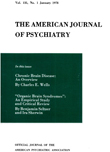THE MEASUREMENT OF AN INHIBITORY PROCESS IN HUMAN HIGHER NERVOUS ACTIVITY: ITS RELATION TO ALLUSIVE THINKING AND FATIGUE
Abstract
The observation of Bleuler and Skottowe that certain recovered schizophrenics continue to show a special form of thinking is examined. The author's theory that this thinking is also shown by a percentage of the normal population who have never suffered from schizophrenia is stated and his clinical description of this mode of thinking, termed "allusive thinking," is elaborated.
It is shown that normal subjects with this thinking show less difficulty in learning the central portion of a word list than do subjects without it. Evidence is advanced that this is due to a weakness of the inhibitory process accompanying attention. This is considered to support Bleuler's view that this mode of thinking is due to such a weakness. It is also considered to support the author's view that the familial occurrence of allusive thinking is due to inheritance rather than environmental contact.
Access content
To read the fulltext, please use one of the options below to sign in or purchase access.- Personal login
- Institutional Login
- Sign in via OpenAthens
- Register for access
-
Please login/register if you wish to pair your device and check access availability.
Not a subscriber?
PsychiatryOnline subscription options offer access to the DSM-5 library, books, journals, CME, and patient resources. This all-in-one virtual library provides psychiatrists and mental health professionals with key resources for diagnosis, treatment, research, and professional development.
Need more help? PsychiatryOnline Customer Service may be reached by emailing [email protected] or by calling 800-368-5777 (in the U.S.) or 703-907-7322 (outside the U.S.).



